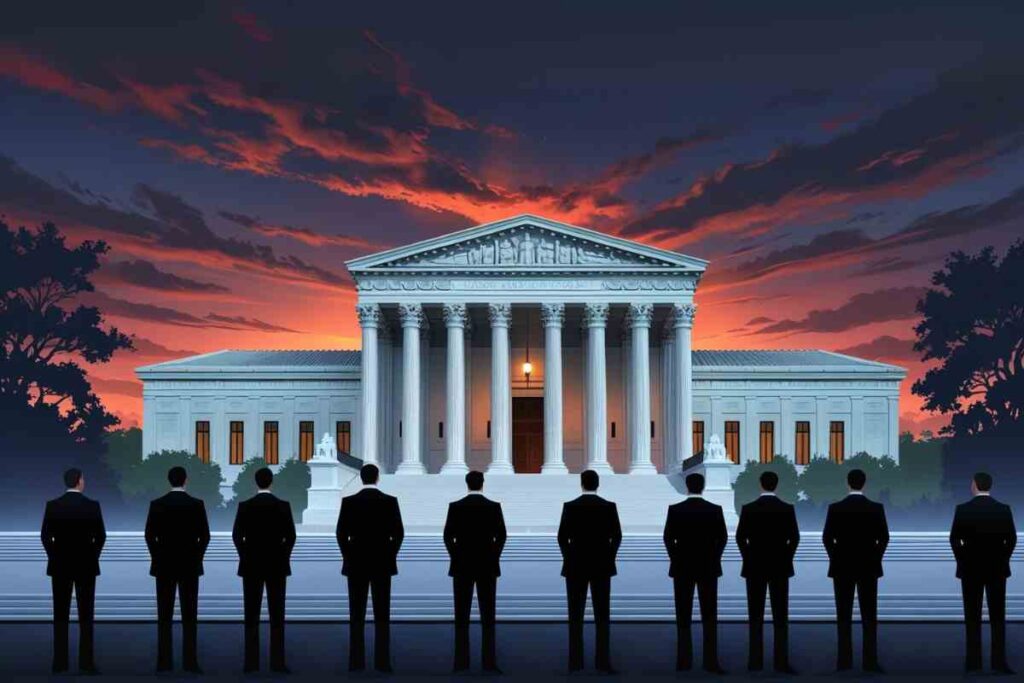The legal spotlight is once again on former President Donald Trump as the Supreme Court prepares to issue a ruling that could shape the future of presidential authority in the United States. Trump’s lawyers anxiously await Supreme Court decision on judicial power because the outcome will not only affect his ongoing legal battles but could also set a historic precedent for how far courts can go in reviewing presidential actions.
This ruling is expected to clarify how much protection a president current or former has from judicial oversight. The stakes are enormous, and the result may alter the balance of power between the executive and judicial branches of government.
What Is the Supreme Court Case About?
At the center of this case is a question that has long tested America’s constitutional framework: Can the judiciary review the actions of a president, and if so, to what extent?
Trump’s legal team argues that some presidential decisions should remain shielded from judicial review under the principle of separation of powers. They believe the courts may be overstepping by examining certain executive actions, which could disrupt the independence of the presidency.
The Supreme Court will now decide whether lower courts acted properly in reviewing Trump’s conduct and whether new limits should be placed on judicial oversight of presidential authority.
Trump’s Legal Strategy Explained
Trump’s attorneys have built their defense around three main points.
Executive Immunity Argument
They argue that a president should have broad immunity from prosecution or lawsuits for actions taken while in office. According to this view, shielding a president ensures that the executive branch can operate without constant legal interference.
Political vs. Judicial Resolution
The defense claims that disputes over presidential conduct should be resolved through political channels such as impeachment, not through lengthy court proceedings. They argue this method aligns more closely with the Constitution’s original design.
Preservation of Executive Authority
Trump’s lawyers are also pushing to protect the traditional boundaries of presidential authority. Their position is that allowing courts to deeply scrutinize executive actions could weaken the ability of future presidents to govern effectively.
The Supreme Court’s Role in Defining Judicial Power
The upcoming ruling is about more than one man’s legal fate. It will help define the limits of judicial power in reviewing executive decisions.
- A decision in Trump’s favor could narrow the role of the judiciary, restricting how much courts can intervene in presidential matters.
- A ruling against him would strengthen judicial oversight, reinforcing the idea that no leader is beyond the reach of the law.
Based on industry updates, legal scholars expect this decision to become one of the most important constitutional rulings in modern U.S. history.
Historical Cases That Shaped Presidential Power
This is not the first time the Supreme Court has ruled on the boundaries of presidential authority. Past decisions have created important benchmarks:
- Youngstown Sheet & Tube Co. v. Sawyer (1952): Limited presidential power by rejecting Harry Truman’s attempt to seize private industry.
- United States v. Nixon (1974): Forced Richard Nixon to hand over tapes during the Watergate scandal, proving executive privilege is not absolute.
- Clinton v. Jones (1997): Allowed a civil lawsuit to proceed against sitting President Bill Clinton for actions taken before office.
Each case shows how the Court has played a critical role in shaping the balance of power between the presidency and the judiciary. The Trump case could soon join this list of defining moments.
Possible Outcomes of the Decision
Legal experts outline three main scenarios for the ruling.
- Broad Ruling for Trump: The Court grants sweeping immunity, making it harder for judges to review presidential conduct.
- Narrow Ruling for Trump: The Court provides limited immunity in specific cases but preserves judicial authority in others.
- Ruling Against Trump: The Court affirms strong judicial oversight, reinforcing that presidents, past or present, are not above the law.
Each path has wide-ranging implications for governance, accountability, and the separation of powers.
Political and Public Reactions
The debate extends beyond the courtroom. Political leaders, legal scholars, and everyday citizens are closely watching the outcome.
- Supporters of Trump view the case as protection against what they call politically motivated prosecutions.
- Opponents warn that granting immunity could open the door to unchecked presidential power.
- Legal experts remain split. Originalists often support limits on judicial power, while progressives emphasize the need for strong checks on the executive branch.
Many users report feeling uneasy about how the decision might affect the upcoming election and the broader health of American democracy.
Timeline and Expected Decision Date
The case has already been argued before the Court this term. A ruling is expected soon, and legal analysts predict it will be among the most closely scrutinized opinions in decades.
A reliable method for following updates is to check the Supreme Court’s official website and major news outlets, which will publish the decision the moment it is released.
What This Means for Trump and Future Presidents
The Supreme Court’s decision will have immediate consequences for Trump’s ongoing legal challenges, especially cases tied to his presidency.
For the broader system, the ruling will either reinforce or redraw the limits of judicial oversight on executive actions. Future presidents will have to operate within the framework set by this decision, which could either strengthen accountability or expand presidential immunity.
Based on legal updates, analysts agree that whatever the outcome, this ruling will be cited for decades as a cornerstone of constitutional law.
Conclusion
Trump’s lawyers anxiously await the Supreme Court decision on judicial power because the stakes could not be higher. The ruling will determine whether courts can continue to serve as a strong check on presidential authority or whether executive power will be shielded more broadly from judicial review.
Beyond Trump’s personal legal fortunes, this case touches the heart of America’s constitutional balance. The Supreme Court’s decision will shape not only today’s politics but the very foundations of governance for generations to come.
FAQs
What is the Supreme Court deciding in Trump’s case?
The Court is reviewing whether a president, current or former, can claim immunity from judicial review for actions taken in office. The decision will clarify the limits of presidential accountability under U.S. law.
When will the Supreme Court announce its decision on Trump’s immunity?
The ruling is expected within the current Court term. Legal analysts say it could be released in the coming weeks, making it one of the most anticipated decisions in recent history.
What could happen if Trump wins his Supreme Court case?
If Trump wins broadly, it could limit how much courts can review presidential conduct. A narrower ruling may grant him some protection but still allow certain judicial oversight.
How has the Supreme Court ruled on presidential power before?
Past cases like Nixon (1974) and Clinton v. Jones (1997) showed that presidents are not fully shielded from judicial oversight. These rulings created limits on executive privilege and presidential immunity.
What does the Supreme Court’s decision mean for future presidents?
The ruling will set precedent for how much legal protection presidents have after leaving office. It could either expand executive immunity or confirm that presidential actions remain subject to judicial review.





